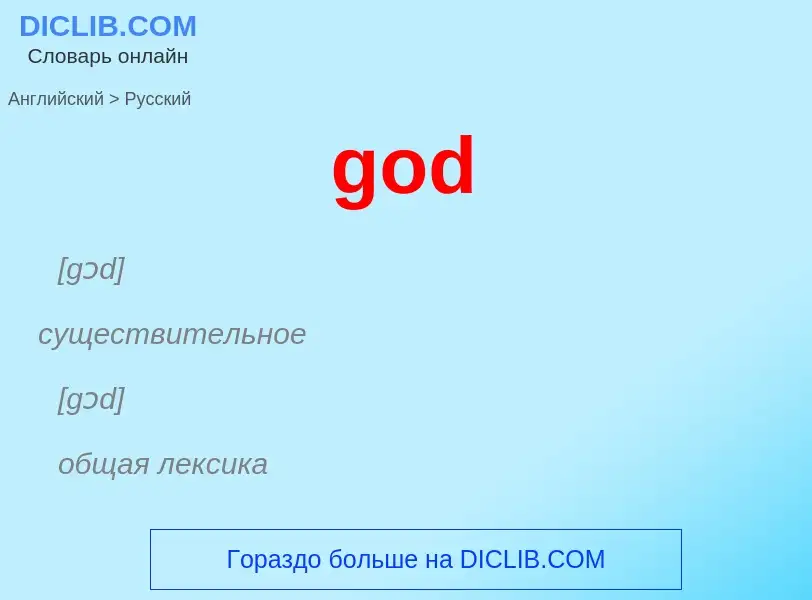Μετάφραση και ανάλυση λέξεων από την τεχνητή νοημοσύνη ChatGPT
Σε αυτήν τη σελίδα μπορείτε να λάβετε μια λεπτομερή ανάλυση μιας λέξης ή μιας φράσης, η οποία δημιουργήθηκε χρησιμοποιώντας το ChatGPT, την καλύτερη τεχνολογία τεχνητής νοημοσύνης μέχρι σήμερα:
- πώς χρησιμοποιείται η λέξη
- συχνότητα χρήσης
- χρησιμοποιείται πιο συχνά στον προφορικό ή γραπτό λόγο
- επιλογές μετάφρασης λέξεων
- παραδείγματα χρήσης (πολλές φράσεις με μετάφραση)
- ετυμολογία
GOD - translation to Αγγλικά
[gɔd]
существительное
[gɔd]
общая лексика
бог
божество
(God) Бог
Всевышний
идол
кумир
в [грам.] знач. междометия боже!
господи!
боже мой! (выражает удивление, радость, страх, гнев и т. п.)
"Ye gods
Milly cried
don't tell me he's going to fire Jim!" - «Боже правый
- воскликнула Милли
- неужели он уволит Джима!»
театр
раёк
посетители галёрки
галёрка (the gods)
глагол
редкое выражение
обожествлять
медицина
генерация разнообразия
Ορισμός
Βικιπαίδεια

In monotheistic thought, God is usually viewed as the supreme being, creator, and principal object of faith. In non-monotheistic thought, a god is "a spirit or being believed to control some part of the universe or life and often worshipped for doing so, or something that represents this spirit or being".
Views regarding God vary considerably. Many notable theologians and philosophers have developed arguments for and against the existence of God. Atheism rejects the belief in any deity. Agnosticism is the belief that the existence of God is unknown or unknowable. Among theists, some view knowledge concerning God as something derived from faith and God is often conceived as the greatest existent. God is often believed to be the cause of all things and so is seen as the creator and sustainer and the ruler of the universe. God is often thought of as incorporeal and independent of the material creation while pantheism holds God is the universe itself. God is sometimes seen as the most benevolent, while deism holds that God is not involved in humanity apart from creation.
Some traditions attach spiritual significance to the relationship with God and see God as the source of all moral obligation, with acts such as worship and prayer. God is sometimes described without reference to gender, while others use terminology that is gender-specific. God is referred to by different names depending on the language and cultural tradition with titles also used to refer to different attributes.


![Chinese]] [[Sini (script)]] Chinese]] [[Sini (script)]]](https://commons.wikimedia.org/wiki/Special:FilePath/Allah Names in Chinese Arabic Script.jpg?width=200)
![Ascension]] from the [[Drogo Sacramentary]], c. 850 Ascension]] from the [[Drogo Sacramentary]], c. 850](https://commons.wikimedia.org/wiki/Special:FilePath/Ascension, sacramentaire de Drogon.jpg?width=200)
![''God Blessing the Seventh Day'', 1805 watercolor painting by [[William Blake]] ''God Blessing the Seventh Day'', 1805 watercolor painting by [[William Blake]]](https://commons.wikimedia.org/wiki/Special:FilePath/Blake God Blessing.jpg?width=200)
![Praying Hands]]'' by [[Albrecht Dürer]] Praying Hands]]'' by [[Albrecht Dürer]]](https://commons.wikimedia.org/wiki/Special:FilePath/Duerer-Prayer.jpg?width=200)
![The Arabic script of "Allah" in the [[Hagia Sophia]], [[Istanbul]] The Arabic script of "Allah" in the [[Hagia Sophia]], [[Istanbul]]](https://commons.wikimedia.org/wiki/Special:FilePath/Istanbul 027 (6445021161).jpg?width=200)
![The [[Mesha Stele]] bears the earliest known reference (840 BCE) to the Israelite God Yahweh. The [[Mesha Stele]] bears the earliest known reference (840 BCE) to the Israelite God Yahweh.](https://commons.wikimedia.org/wiki/Special:FilePath/Mesha Stele (511142469) (cropped).jpg?width=200)
![Ahura Mazda (depiction is on the right, with high crown) presents [[Ardashir I]] (left) with the ring of kingship. (Relief at [[Naqsh-e Rustam]], 3rd century CE) Ahura Mazda (depiction is on the right, with high crown) presents [[Ardashir I]] (left) with the ring of kingship. (Relief at [[Naqsh-e Rustam]], 3rd century CE)](https://commons.wikimedia.org/wiki/Special:FilePath/Naqsh i Rustam. Investiture d'Ardashir 1.jpg?width=200)
![[[Isaac Newton]] saw the existence of a Creator necessary in the movement of astronomical objects. (Painting by [[Godfrey Kneller]], 1689) [[Isaac Newton]] saw the existence of a Creator necessary in the movement of astronomical objects. (Painting by [[Godfrey Kneller]], 1689)](https://commons.wikimedia.org/wiki/Special:FilePath/Portrait of Sir Isaac Newton, 1689.jpg?width=200)
![five main arguments]] as proofs for God's existence. (Painting by [[Carlo Crivelli]], 1476) five main arguments]] as proofs for God's existence. (Painting by [[Carlo Crivelli]], 1476)](https://commons.wikimedia.org/wiki/Special:FilePath/St-thomas-aquinas.jpg?width=200)
